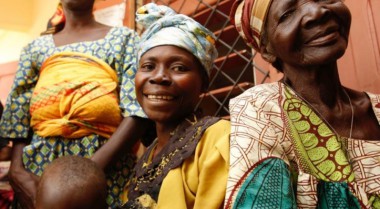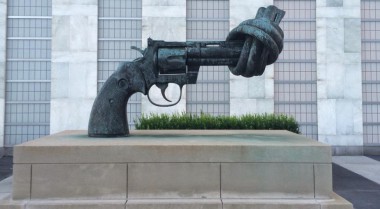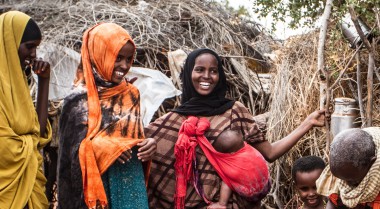
Does the Key to Sustaining Peace Lie in Resilient Social Contracts?
The striking increase in violent conflict over the last 15 years has been marked by the number of violent conflicts tripling since 2010 and the rise of non-state actor conflict in many regions. Amid the untold suffering there has been an important positive impact: policy consensus at the highest levels that sustaining peace and preventing violent conflict must be priorities. This is good news, as prevention will not only save lives, but also resources. A new World Bank and United Nations report, Pathways to Peace: Inclusive Approaches to Preventing Violent Conflict, concludes that up to tens of billions in losses in countries and billions for the international community in interventions can be saved per year through prevention. This report, and the Security Council mandated agenda that preceded it, increase the United Nations' commitment to more strategic analysis and action on these issues. While these are exciting developments, perhaps most importantly due to the level at which they have taken hold, important questions remain: what can be done that has not been tried before? And, vitally, how to ensure national actors—states and societies—are steadfastly in the driver's seat of action?
Many may point to the 2030 Agenda for Sustainable Development, which clearly speaks to issues of peace, governance, and security as means to facilitating coherent national action. Indeed, governments are developing roadmaps for the agenda's realization. While the agenda goes beyond traditional development frameworks, led by development actors, it remains fundamentally challenged to address the underlying politics that too often mediate against a unified analysis of conflict and fragility, and drives partnered commitments for key priorities deserving action across the wider political and security realms. Arguably something else is needed, but what?
Transcending elite bargains and forging and linking more inclusive and transparent political settlements to durable arrangements for peace is an increasingly agreed upon and evidence-based foundation for both achieving and sustaining peace.
Building upon my previous analysis, there is a need to embrace a unifying concept that frames thinking and actionable ideas in order to better support the development of a national vision for peace that cuts across the security, political, and development realms: the social contract. Drawing on earlier findings from an eleven-country study called Forging Resilient National Social Contracts: Preventing Violent Conflict and Sustaining Peace—supported by a working group of scholars, policy advisers, and partners from the UN Development Program (UNDP) and Friedrich Ebert Stiftung—allows us to conceive of how a social contract approach can provide both the conceptual inspiration for a vision that national stakeholders can rally behind, and the elements of an integrated practical framework that engages vital pillars, siloes, phases, and dimensions of transitioning out of conflict and fragility.
From Political Settlements to Resilient, Inclusive Social Contracts
Transcending elite bargains and forging and linking more inclusive and transparent political settlements to durable arrangements for peace is an increasingly agreed upon and evidence-based foundation for both achieving and sustaining peace. It is also a cornerstone of a social contract in countries emerging from conflict and fragility—encompassing inclusive, transparent, and institutionalised arrangements that deliver results and build trust within society and with the state.
Amidst the array of findings still in development, the aforementioned study explores how this process of moving from a political settlement to a societally owned, resilient national social contract can be assessed and understood, with important implications for policy and practice. It does this through an examination of three postulated drivers of such a contract, through a proposed framework of "Institutional Spheres and Mechanisms of Social Contract Making."Consistent with the policy consensus that addressing root causes of conflict and grievances is a requirement for peace, the study investigates how core conflict issues (CCIs)—issues that, unlike grievances and root causes, are neutrally articulated and broadly agreed upon by conflict parties and society at large—are being progressively addressed, over time. Specifically, this means understanding how commitments made in the peacemaking sphere at the national and political level (e.g. through a peace agreement) are linked to and addressed in other spheres and through related mechanisms of "social contract-making" in support of comprehensive, societally-owned addressing of the issues.
The logic of a few of the findings so far around nine cases—Bosnia-Herzegovina, Colombia, Cyprus, Nepal, South Africa, South Sudan, Tunisia, Yemen and Zimbabwe—summarized below, provide important takeaways.
Social contract-making spheres and mechanisms are often not well-linked in ways that promote the implementation of peace agreements in a coherent and effective way and the development of an increasingly inclusive political settlement.
The early stages of the peace negotiations, and notably the peace agreement, offer possibilities for redefining parameters for inclusion and exclusion, and positioning of different groups and issues, often with long-term effects and positive or negative repercussions. This finding reinforces research around inclusive settlements with new case evidence, illustrating how this occurs, whether positively through the catalysing of more inclusive politics, and negatively by: the development of separate ethno-nationalist institutions; citizens or groups feeling excluded and becoming spoilers; and the propensity for informal agreements that undermine the official agreement and process.
Second, CCIs have often not been effectively addressed over time or through previous peace processes and agreements, which directly undermines the inclusiveness of the political settlement. This occurs in different ways, for example in the agreement design or its implementation, and at times, through extant contradictions around provisions that undermine agreement implementation. Intriguing case illustrations are identified and shared in the full summary.
Another finding builds upon these two, namely that social contract-making spheres and mechanisms are often not well-linked in ways that promote the implementation of peace agreements in a coherent and effective way and the development of an increasingly inclusive political settlement. Other findings illustrate more specifically where break downs occur, for example in state institutions, the hardware for carrying forward peace agreement implementation, and similarly, non-state and customary institutions, that are often not sufficiently or systematically engaged in addressing CCIs, including at sub-national levels.
Together, these findings arguably offer a valuable way to both assess and understand how peace agreements, and the political settlements underlying them, can soundly address the core issues that drive conflict, and transition into a more lasting formula, namely an inclusive, resilient social contract that has sound institutional support. These and other insightful findings around inclusive processes and social cohesion offer an innovative, conceptual, and practical framing that may help to address a number of the priority concerns and challenges being elevated in the aforementioned policy arena. They also suggest areas of ongoing complexity that deserve attention, lest old mistakes on international strategy regenerate in ways that can ultimately run counter to the deepened commitment to prevention that is taking shape. Perhaps most importantly, this research offers a fresh approach to support synergistic efforts across peace, security, and development sectors and pillars, in ways that put national actors in the drivers' seat for developing a common vision for peace. Ultimately, the study's evidence illustrates that strong movement on the three postulated drivers holds particular weight in the achievement of a resilient national social contract that drives and sustains peace.
Valuable broadly for national and international actors working on peacebuilding, statebuilding, and development, the study holds particular relevance for the UN as the Secretary-General's report launches in late February. While the greatly anticipated report focuses on what the UN system needs to do to strengthen policy and practice coherence, leadership, partnerships, and financing to effectively support the sustaining peace agenda, the substantive content of what sustaining peace means in and across countries remains the heart of the matter.
Erin McCandless is the Research and Project Director of "Forging Resilient Social Contracts," and teaches in the Graduate Program of International Affairs at The New School in New York.
This piece was first published by the International Peace Institute on 19 January 2018.



